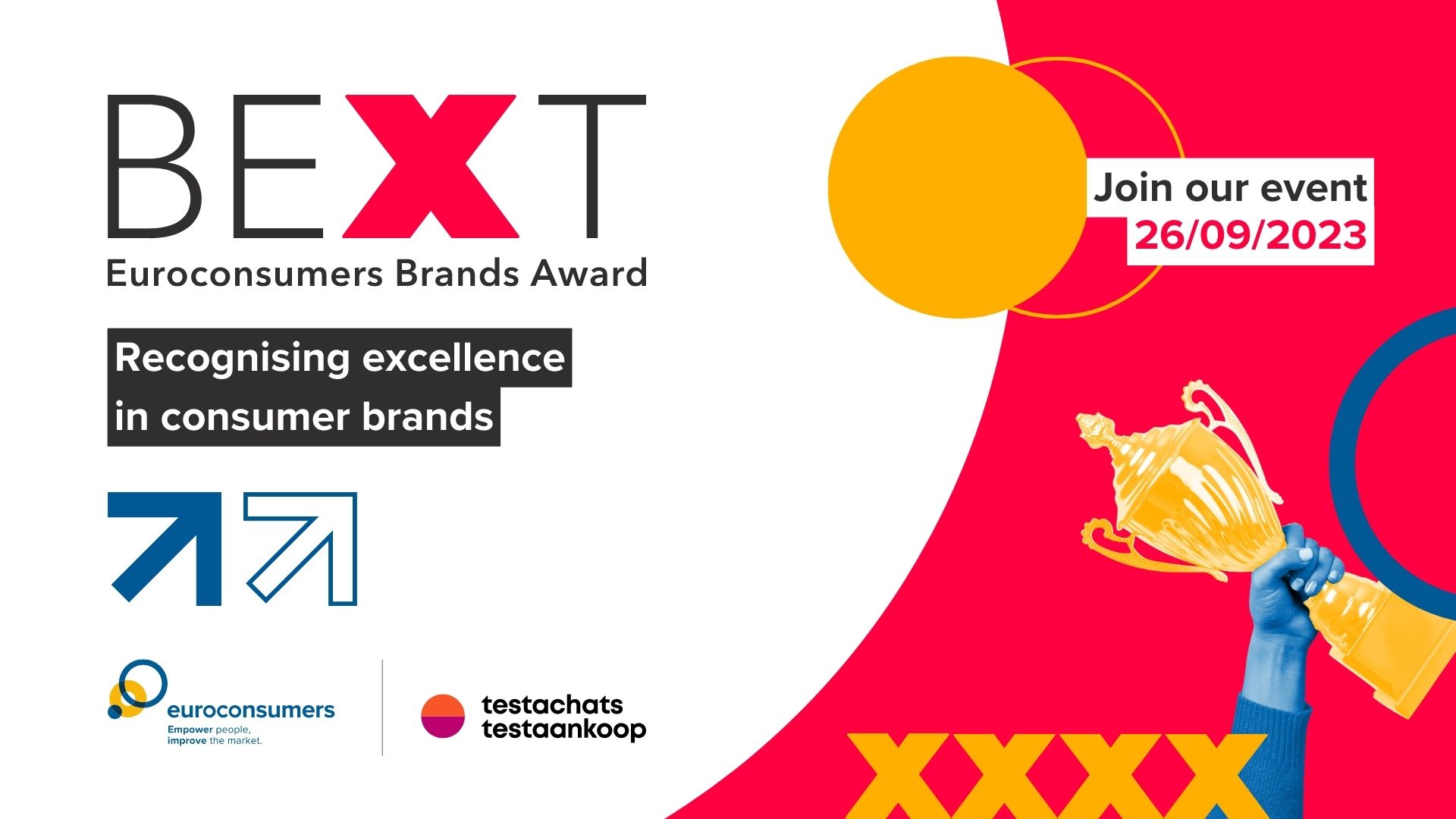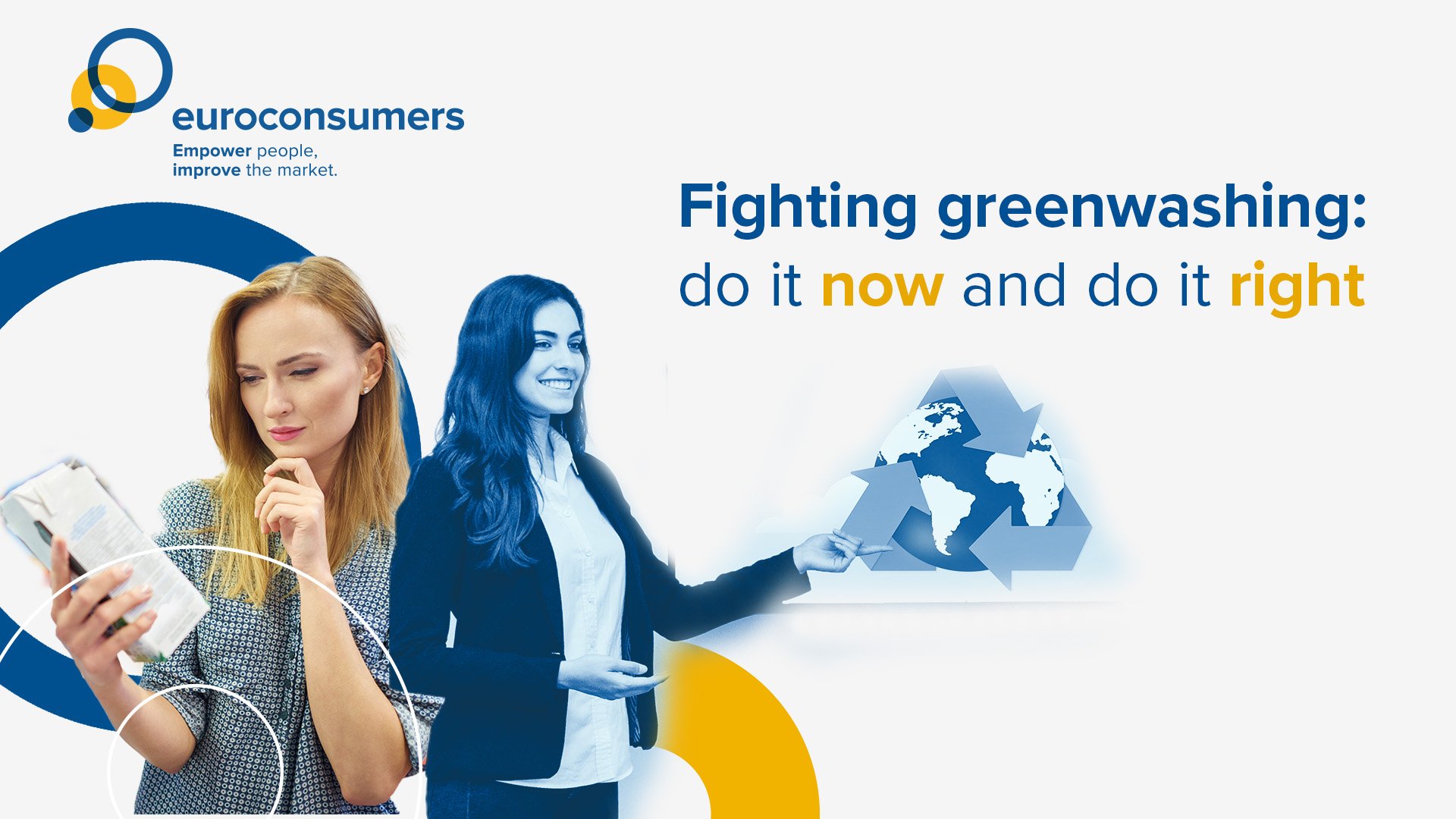
2023 BEXT awards celebrate brands rising to the sustainability challenge
The fifth edition of Euroconsumers’ BeXt awards will celebrate the brands that stand out on sustainability, value and reliability.



The Green Claims Directive has the unique opportunity to deliver trustworthy green labels to consumers – if done in the right way. The rules must be fierce on the fake labels, but not kill off the valuable and innovative ones in the process.
Euroconsumers welcomes the intent of the Directive but is very concerned by parts of it that could be counterproductive to its goal of consumers and companies benefiting from a system of trusted environmental labeling.
Chief amongst concerns are proposals that jeopardize the use of holistic environmental labels based on aggregated indicators like price and quality unless they are developed at an EU level, and a complex and slow process for verification.
In this blog, we draw on a new survey of 16,000 people in 16 countries to show how frustration amongst consumers makes the job of getting trustworthy, clear environmental labels to market so urgent. We then look at the specific changes needed in the Green Claims Directive to make sure it addresses key consumer needs and doesn’t discard years of innovation in environmental labeling.
The survey is a joint collaboration with BEUC, ICRT and the consumer organizations in the target countries with Euroconsumers developing the questionnaire as well as carrying out the data collection and statistical analysis.
Consumers want to buy green. A quarter of respondents said they ‘often’ look for environmental information when they make purchases, 61% say they do this sometimes.
But they find themselves swimming in a sea of labels, claims, advertising and logos that makes choosing the most sustainable option hard.
Many are also suspicious of brands’ motives – half believe green claims don’t accurately reflect the real environmental impact of products, and are mostly marketing techniques to increase sales.
However, the survey suggests that misleading green claims by one company could have a much deeper impact on trust. Three in ten respondents said they would feel less confident about green information across the market if a particular company was shown to be making misleading claims.
“For the sake of an eye-catching claim to boost sales, companies are risking much deeper long term distrust in the market.”
Els Bruggeman, Head of Policy and Enforcement, Euroconsumers
Such mistrust is damaging for companies working hard to create products and services with low environmental impact. If consumers mistrust all the information, they won’t be able to choose and reward those innovative companies engaging in the green transition.
There’s a huge opportunity for trusted, clear environmental labels to support a transition to greener consumption.
The data shows that almost 40% say they would feel “manipulated” if a product or service was presenting false or unverified green claims, and 36% say that would make them stop buying from that company.
Consumers want claims to be backed up. Three quarters of respondents think green claims and labels should only be authorized for use if they are pre-approved or verified. Currently, over a third (35%) believe environmental claims have already been verified by a public authority or by a third party – but this is not true in most cases.
To close this loop, there needs to be swift, easy and affordable pre-approval processes for labels which can be verified by a public or independent private third party. The survey backs this up with almost 70% of respondents saying they trust public authorities and third-party organizations to fulfill that role.
As currently written, the Green Claims Directive makes swift, third party verification difficult. This could stifle the innovation of long term, trusted testing and information organisations like Euroconsumers’ members to deliver verifiable, meaningful information to consumers as they currently do through the Green Choice label.
We’d like to see only the overall methodology and governance of the label schemes to be subject to verification. The current proposal to individually verify every criteria and testing programme for every product category will put current, recognisable, trusted labeling schemes at risk.
Chief amongst concerns is a proposal to ban the use of labels and scoring based on aggregated indicators of a range of environmental impacts, unless that label is developed at the EU level.
This will dramatically restrict the development of new and existing labels and testing programs that bring added value.
In practice, most labels come from innovations at a national level, some from specialist testing and information organisations like Euroconsumers’ country members. Stopping these labels and scoring would block initiatives at a national level that are leading beneficial new labelling products for green claims.
Banning nationally developed holistic labels would also put valuable labels already developed by consumer organisations like ours which rate products on more than just environmental aspects. Labels like Green Choice reflect real life consumer decision making, where people will also be weighing up other factors like price, quality and durability. Such labels empower consumers to make sustainable, yet affordable choices and help shift the market to one that can deliver for consumers of all incomes.
If environmental labels based on aggregated environmental indicators are based on robust assessment methods and independent governance there is no reason why they should be prohibited.
The survey found claims about carbon to be particularly confusing. Although 40% of respondents believed they understood carbon claims, when asked in more detail about carbon claims, most people were incorrect. For example:
This is particularly worrying as many of the measures companies take to ‘neutralise’ carbon (for example, investing in reforestation projects to compensate for their CO2 emissions) do not deliver what the term suggests. Carbon neutrality is something that can be achieved at a global level but it is not accurate to say that a product or company is carbon neutral, or give the impression that purchasing a product has no negative impact on emissions.
The Green Claims Directive needs to get tougher on the rules for using the term ‘carbon neutral’ to avoid more consumer confusion.
The survey showed a strong appetite from consumers for stronger measures than those in the Green Claims Directive. With countries at COP28 agreeing to move away from using fossil fuels, it seems consumers are tired of their games:
They were particularly strict on fossil fuel companies, with 38% of people saying fossil fuel companies should not be allowed to engage into any kind of advertising at all – let alone green claims.
People are living in a world of greenwashing, rules to shore up the strength of green claims are urgently needed before the problem becomes systemic and trust gets permanently broken.
The appetite for stronger regulation to rein in companies who are harming the environment is clear – the Commission should recognise this as the Green Claims Directive develops and create something fit for consumers now and in the future.
Companies are finally seeing sustainability as a competitive advantage and consumers want to buy green. Both sides need a robust system of green claim verification which can empower consumers and improve the market to shift towards a circular, sustainable one.
The current Green Claims Directive is a powerful step in that direction, however its text also holds provisions that could jeopardize this with some disproportionate demands on verification and its suppression of existing, valuable consumer-ready schemes.
EU and national legislators need to sit up and listen to what consumers want and the expertise and experience of consumer organisations who have been at the forefront of trusted, meaningful labels for decades.
About the survey:
The Great Green Maze: How environmental advertising confuses consumers, BEUC 2023
This survey is a joint effort from BEUC, ICRT and 16 Consumer organisations: Altroconsumo, CHOICE, Consumentenbond, Tudatos Vásárlók Egyesülete, Forbrugerrådet Tænk, DECO, TestAchats/TestAnkoop, Verein für Konsumenteninformation, Zveza Potrošnikov Slovenije, Organización de consumidores y Usuarios, Sveriges Konsumenter, Forbrukerrådet, dTest, Consumer Reports, Protégez-Vous, Consumer NZ.
BEUC produced the survey, developing the questionnaire with Euroconsumers, which was then adapted to the national context of the 16 countries: Australia, Austria, Belgium, Canada, Czechia, Denmark, Hungary, Italy, the Netherlands, New Zealand, Norway, Portugal, Slovenia, Spain, Sweden and the United States. In every country 1,000 interviews were conducted by Euroconsumers addressing a sample of the population aged 18-74, representative regarding gender, age, and region of each of the national populations. An a posteriori weighting procedure has been applied to make the sample also representative regarding educational level.